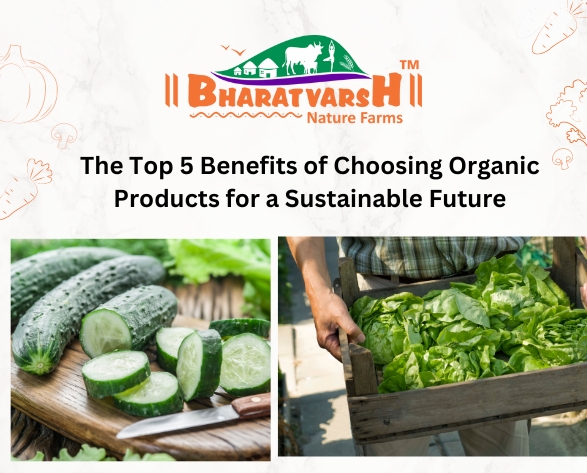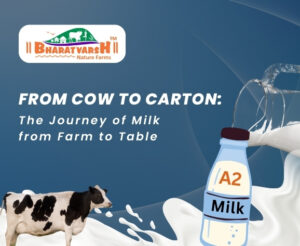In a world where sustainability is paramount, each of our choices has the potential to make a profound impact on the environment. One choice that stands out for its positive contribution is opting for organic products. Beyond just personal health benefits, organic products offer a holistic solution that embraces nature, nurtures the soil, and safeguards our planet’s well-being. Let’s delve into the top 5 remarkable benefits of choosing organic and discover how this simple decision can lead us towards a greener, healthier, and more sustainable future.
Organic Food: What’s that?
You, for sure, must have heard and read a lot about organic food. So it isn’t an unfamiliar term. But let’s dive a little deeper in case you are new to it or wish to know a little about it.
Organic food refers to agricultural products that are grown and processed without the use of synthetic chemicals, genetically modified organisms (GMOs), or irradiation. It is a holistic approach to farming that prioritizes environmental sustainability, animal welfare, and the production of wholesome, nutrient-rich food. Organic farming relies on natural techniques and practices that work in harmony with nature. Instead of synthetic pesticides, organic farmers use biological pest control, crop rotation, and companion planting to manage pests and diseases. They nourish the soil with organic matter, compost, and natural fertilizers to enhance soil fertility and structure.
One of the key aspects of organic food is the absence of GMOs. Organic farmers do not use genetically engineered seeds or crops, preserving the integrity of plant biodiversity and preventing potential ecological risks associated with genetic modification. Organic livestock farming ensures that animals are raised in humane conditions. Organic animal products, such as meat, eggs, and dairy, come from animals that have access to outdoor areas, are fed organic feed, and are not treated with antibiotics or growth hormones.
Choosing organic food offers several benefits. Firstly, it reduces exposure to potentially harmful chemicals commonly found in conventional farming. Organic food is also believed to be richer in essential nutrients and antioxidants, providing a potential health advantage.
Furthermore, organic farming practices prioritize environmental conservation. By avoiding synthetic fertilizers and pesticides, organic agriculture helps protect water quality, preserve soil health, promote biodiversity, and reduce the carbon footprint associated with conventional farming.
By choosing organic food, you actively support sustainable agriculture, protect their health, and contribute to a greener and more sustainable planet. It’s a mindful choice that embraces a holistic approach to food production, promoting a healthier future for both individuals and the environment.
The Top 5 Benefits of Choosing Organic Products for a Sustainable Future
Join us on a journey and discover how a simple decision can pave the way for a greener, healthier, and more sustainable future.
1. Preserving Soil Health:
When we choose organic products, we actively support sustainable farming practices that prioritize the health of our precious soils. Organic farmers work in harmony with nature, employing methods like composting, crop rotation, and natural pest control to maintain the fertility and vitality of the soil. By abstaining from synthetic fertilizers and harmful chemicals, organic farming protects the soil’s structure, enhances its nutrient content, and prevents erosion. In doing so, we contribute to sustainable agricultural systems that nurture the Earth’s foundation and promote long-term soil health.
2. Protecting Water Quality:
Conventional farming often relies on chemical-intensive practices that pose a significant threat to water resources. Pesticides and synthetic fertilizers can contaminate streams, rivers, and groundwater, harming aquatic ecosystems and jeopardizing our water supply. In contrast, organic farming prohibits the use of these harmful substances, reducing the risk of water pollution. By choosing organic, we actively safeguard our water quality, ensuring that future generations can enjoy clean and pristine water sources.
3. Promoting Biodiversity and Wildlife Conservation:
Organic farming goes beyond nurturing crops; it fosters an environment that supports biodiversity and preserves wildlife habitats. By abstaining from chemical pesticides, organic farmers provide a haven for beneficial insects, birds, and other wildlife species. The integration of natural practices such as hedgerows, wildflower strips, and diversified crop rotations creates a thriving ecosystem where pollinators flourish, pests are kept in check, and the delicate balance of nature is maintained. By choosing organic, we actively contribute to the preservation of biodiversity and protect the interconnected web of life on our planet.
4. Mitigating Climate Change:
Organic agriculture holds immense potential in the fight against climate change. Organic farming methods prioritize carbon sequestration, reducing greenhouse gas emissions, and promoting sustainable energy use. By adopting organic practices, farmers focus on building healthy soils rich in organic matter, which serves as a powerful carbon sink. Moreover, organic farming minimizes reliance on synthetic fertilizers, thereby reducing the associated emissions from their production and application. By choosing organic products, we actively participate in combating climate change, one of the greatest challenges of our time.
5. Supporting Sustainable Communities:
Beyond environmental benefits, choosing organic products also has a profound impact on the well-being of farmers and local communities. Organic certification standards ensure fair trade practices, including fair wages, safe working conditions, and respect for workers’ rights. By supporting organic farming, we help foster sustainable livelihoods, strengthen local economies, and promote social justice. With each purchase, we contribute to a more equitable and sustainable world, where the welfare of people and the planet are held in high regard.
Conclusion:
The choice to embrace organic products resonates far beyond our shopping carts. It is a powerful statement of our commitment to a sustainable future, where harmony between humans and nature is restored. By opting for organic, we preserve soil health, protect water resources, promote biodiversity, combat climate change, and empower communities. Together, let’s harness the transformative power of our choices and pave the way for a greener, healthier planet for generations to come.
Contact Bharatvarsh Nature Farms:
You can reach out to us for some useful tips on growing your own organic garden. If you already have one, contact us for supplies of these natural products for your rooftop garden, lawn, or organic farm.
For more details, please visit our website: https://bharatvarshnaturefarms.com/
Write to us at: info@bharatvarshnaturefarms.com or call us at: 91-8603214214, 8650214214
Read More: NOURISHING NATURALLY: THE POWER OF A2 MILK FOR BABIES AND CHILDREN – Bharatvarsh Nature Farms




